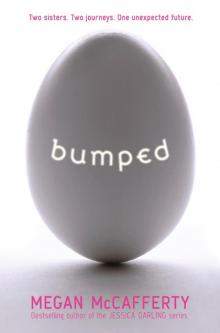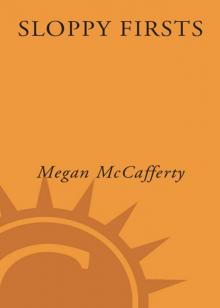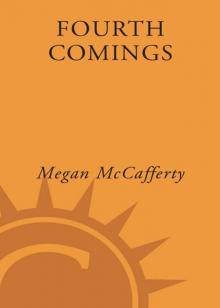- Home
- Megan Mccafferty
Perfect Fifths Page 6
Perfect Fifths Read online
Page 6
“I’m on line behind twenty disgruntled members of the Tristate Chapter of the Barry Manilow International Fan Club,” Jessica replies matter-of-factly. “And they have apparently decided to stage a sing-in.”
“Are you making this up?” Hope asks.
Jessica holds her phone out toward the voices, which spurs the protestors to sing even louder and more off-key. CAN’T SMILE WITHOUT YOU. CAN’T SMILE WITHOUT YOU.
Jessica says, “Now hold out your phone so I can hear the sound of wild donkeys humping.”
“No way! I’m safe in my room right now. I’m not going out there to court the attention of lusty donkeys.”
“How can I know your story is both strange and true?”
“You’ll just have to trust me.”
I do, thinks Jessica. More than anyone. “I better go,” she says instead. “I’m having trouble hearing you, and my phone is on borrowed time because I think I packed my charger in my checked luggage.”
“So what should I tell Bridget and Percy?” Hope asks.
Jessica can tell from Hope’s serious shift in tone that she was specifically instructed by Bridget and Percy to find out if they need to book the local guy. “Honestly?”
“Honestly.”
“Tell them I’ll do everything in my power to get out of here today,” Jessica says with resignation. “But in all likelihood, I won’t get down there until tomorrow afternoon.”
Jessica doesn’t elaborate on the consequences of an afternoon arrival. Hope understands.
“You’ll be here soon enough,” Hope replies with forced cheer. “And I’ve somehow managed to take many donkey-free pictures, so you’ll feel like you didn’t miss anything. You’ll feel like you were here the whole time.”
But I’m not, thinks Jessica as she shuts off her cell. I’m not.
The phone is barely back in the bag before Jessica is debriefing herself on why she never got around to mentioning Marcus. Perhaps she’s worried that this accidental omission will turn into a conspicuous one—the kind that has caused problems in the past. But she quickly dismisses the notion as absurd. There was never the right moment to bring it up. And besides, it was a run-in, not a reunion. “Accident” is a more accurate description, and it was over almost as soon as it started. What happened with Marcus amounted to a few minutes so fleeting and insignificant that Jessica may fail to find a good reason to tell anyone about it at all.
Jessica’s stomach growls, and it’s almost loud enough to be heard over the BMIFC’s second protest song.
But it’s daybreak! If you wanna believe!
Jessica is famished. She didn’t have time for breakfast, or rather, she chose a shower over breakfast, and now she’s starving. Before dashing out the door, her mother insisted that Jessica take along a travel mug full of coffee and a waxy paper bag promoting Papa D’s donuts, the chain now fully owned and operated by her sister’s ex-husband.
“Take it,” her mother insisted. “You may not be hungry now, but you’ll thank me later.”
Jessica scowled at the bag.
“You told me you’d be in the Virgin Islands,” Mrs. Darling said. “If I had known you were coming home, I could have shopped accordingly.”
“But from Papa D’s donuts, Mom? Really?”
“Those donuts still pay for Marin’s private school education, Jessica.”
Jessica now growled and scowled. She didn’t have a problem with the donut, per se; she didn’t want to take it as a matter of principle. G-Money had bought out his business partner a year or two before and now was reaping the profits from dozens of drive-through locations all over the country, proving his theory that portable angioplastic treats were a recession-proof commodity. Apparently, in times of crisis, Americans cling not to guns and religion, but coffee and crullers. Therefore, to support Papa D’s donuts was to support G-Money. And though G-Money and Bethany had, by all accounts (both figurative and literal—as there were several million dollars in assets to divvy up), divorced amicably two years ago, and had both quickly and happily reattached themselves to new romantic partners, Jessica wasn’t so eager to forgive and forget as everyone else—including the betrayed. Bethany’s apparent ambivalence about her ex-husband’s affairs (“Once the divorce papers were signed, it was all water under the bridge,” she said. “More like sewage,” Jessica muttered) and her insistence on shielding seven-year-old Marin from any of her Daddy’s wrongdoing (“He’s a jerk, but he’s still her father!”) sometimes made it difficult for Jessica to talk to her sister about anything deeper than the latest tabloid captions. (BAD BRIT! LOCO LILO!)
While Jessica obviously hasn’t been married and freely claims ignorance on the complexities of that subject, she does understand the motivation to cheat, having once been a cheater herself. She cheated on Marcus as a sophomore in college. She cheated with someone she didn’t care about. She cheated knowing that Marcus would be devastated by the betrayal. She loved Marcus, knew he loved her back, and yet she cheated anyway.
One might think that her own experiences would make her more sympathetic toward Bethany’s straying husband, since she had failed to make good on her own monogamous promises. But the truth is, every cheater is a saboteur. Cheaters make the choice to violate trust, break vows, renege on promises in full view of the messy consequences. Jessica suspects that G-Money’s reason for cheating on Bethany was similar to her own reason for cheating on Marcus: It requires less effort to fuck up a relationship than to make it work. At twenty years old, this behavior is condemnable yet indicative of the inexperience of youth. Fifteen years later, it’s just goddamn pathetic. Bethany and Marin deserved better, and they got better. And if G-Money was so unhappy in the marriage, so did he.
Jessica couldn’t explain this to her mother, especially not in the last seconds before heading out the door for the airport. Mrs. Darling, as always, was fully turned out at eight A.M., her professionally unlined face all the more awakened by the invigorating presence of her daughter back, albeit briefly, in the fold. She welcomed this opportunity to be helpful, to serve a purpose in her younger child’s independent life, even if the attempt was unwanted and wrongheaded. Jessica could see how eager, almost desperate, her mother was to provide her with this coffee and donut. To reject the offering would be to reject her. Haunted by the memory of Mrs. Dae’s shattered face the night before, Jessica accepted both the coffee and the donut bag with a smile and a simple thank-you. Seeing her mother’s expansive, overreciprocated smile made Jessica want to pay reparations for every smirk, snort, and eye roll she’d ever casually and cruelly delivered.
Jessica downed the coffee and jettisoned the mug, accidentally leaving it on the floor of the Town Car in the chaos of arrival. The donut—spurned by the only vegan livery driver in New Jersey—is still in its unopened bag, tucked deep within one of the hidden pockets of Jessica’s carry-on, completely forgotten until right now. Jessica reaches in and rummages around until she feels something soft and crinkly. She unfolds the donut bag, peers inside, and recognizes one of the shop’s best sellers, a pink-frosted, rainbow-sprinkled vanilla cream puff once called the McGreevey during a brief and ill-conceived marketing campaign in which all Papa D’s products were named after famous New Jerseyans. This donut, more like a cupcake than anything anyone should ever eat for breakfast, was her mother’s way of making the morning more festive, distinct from the other 364 days of the year.
The McGreevey is something she wouldn’t normally eat in her real life, as opposed to her airport life, which, if Jessica thinks about it, is slowly but surely taking over the former. Despite her frequent flying, Jessica is merely a competent traveler. She hasn’t spent enough time in the air to become a sky warrior, one of the savvy business-class masses who manage to fit an impressive array of gourmet foodstuffs in their carry-on luggage. As such, Jessica continually finds herself in one airport newsstand or another, her common sense and taste buds dulled by jet lag, swiping her debit card to buy bags of crunchy, starchy, salty, sugary cr
ap that she wouldn’t consume anywhere else in the world, as if the airport’s artificial atmosphere makes her crave only the fakest approximations of food. How many times has she found herself slumped on a bench at the departures gate, licking high-fructose residue from her fingers and thinking, Why the hell did I just eat that?
This donut will be good for a brief rush of sweet elation, quickly followed by the inevitable crash, withdrawal, and lingering sugar hangover, but she doesn’t care. Hell no, not today. Her teeth sink into the dense cake, and the sensation brings such indulgent relief that she scarcely notices when a glob of vanilla cream filling oozes from the opposite side and splats onto her foot.
thirteen
“Let me help you,” cajoles Jonelle, blinking up at Marcus through three coats of mascara.
This woman peddles an ersatz eroticism that Marcus does not buy in to. Men are anthropologically programmed to want women with violin curves and poreless skin, saucer eyes and plump lips, but this one looks like what happens when a seventh-grade girl creates a I WANNA LOOK LIKE THIS composite of celebrity body parts and facial features that reflects an immature idea of perfection. On their own, the features are alluring. But when the disparate parts are all awkwardly glued together through cosmetic surgery, it comes across as a collagelike caricature of sexiness that makes Marcus feel bad for Jonelle.
A Frankenskank, thinks Marcus. That’s what Jessica would call her.
He winces, regretting the expression as soon as it comes to him as being unfair to Jonelle and Jessica. Especially Jessica. He hates when he does this, when he puts hypothetical words in her mouth, imagining how she might react to different moments in his life without her. It has been many months since Marcus has spoken her name aloud, but that hasn’t stopped the conversations inside his mind. Like when he sees a film he knows she would appreciate (Before Sunset), reads a book that could speak to her like it has spoken to him (Youth and Life), or hears a song that should be on her iPod (anything by the Mighties—that is, before the group’s lead singer/songwriter made himself the “my,” Marcus the “he,” and Jessica the “you” in their viral sensation, “My Song Will Never Mean as Much [As the One He Once Sang for You].”) Marcus sees, hears, reads, and thinks of Jessica, inventing her side of the dialogue in the absence of the real thing. Far less inspired and more shameful are the artless, mundane moments like this, when it’s almost as if his subconscious is reaching for excuses to remember Jessica for no legitimate reason other than that he can’t stop himself from doing so. And what a word to put in her mouth—Frankenskank! It’s hardly charitable of him to think of Jessica as being as snarky and judgmental as ever. And if she is? So be it. He always loved her because of, not in spite of, her flaws. Her biggest flaw, in his mind, was her inability to believe that was true.
Marcus delivers a wan smile.
“I can help you,” Jonelle promises.
Marcus focuses on a tiny heart-shaped gold charm trapped between her mountainous breasts like an unlucky climber abandoned in a crevasse. He identifies with the poor guy. “I doubt it,” he replies.
“I really want to help,” she insists huskily.
Marcus takes off his glasses and looks at her through fuzzier, more forgiving 20/60 vision. He wonders if this change in perspective makes it easier to see what she looked like before she felt like she had to do this to herself in order to be loved. Make no mistake, no matter what explanations or excuses or equivocations she’s given—from “It’s my body and I can do whatever I damn well please” to “Everyone gets a little work done these days” to “It’s a low price to pay for high self-esteem”—what else but the need to be loved could motivate someone to do this to herself? She never gave herself a chance, Marcus thinks, to be loved for who she is, flaws and all.
His watch feels like a shackle around his wrist, immediate punishment for his presumed superiority.
“I’m in the business of helping anxious passengers.” Jonelle sneaks a fingernail into the pocket that conveniently calls redundant attention to her breasts. She pulls out a small white card and hands it to him:
Jonelle Jenkins
Aeroanxiety Specialist
thAIRapy spa @ Newark Liberty International Airport
Marcus’s heart sinks with the revelation that she is a clinical therapist, perfume spritzer, and masseuse all in one. He had wanted Jonelle to surprise him, to teach him a lesson about false first impressions. Against his better judgment, he tries to salvage the conversation by asking a question. “Do you always target clients like this?”
Jonelle’s mouth widens, better for showing off a full set of custom veneers. “Only when they look as anxious as you do.”
Marcus stands up to his full height for the first time during the conversation, stretching well over six feet tall. “How anxious?” He needs to get an objective opinion.
“Bordering on terrified,” she says. “You want to move forward, but you can’t. You aren’t brave enough.”
Marcus nods in reluctant agreement, and Jonelle is encouraged by his gesture of approval. She edges one step closer, body-slamming Marcus with the full impact of a heavyweight perfume that evokes a nineteenth-century opium den. “You’re trembling,” she says. When Jonelle gently presses her hand into his palm, Marcus yanks his hand away and stuffs it into his pocket. The sudden fierceness of this gesture makes Jonelle gasp in a rather unwholesome way. “Well!” she cries out, taking a step backward to collect herself. “Well!”
“I’m sorry,” Marcus says. “My issues are beyond any therapy.”
“If you need me,” Jonelle says breathily, gesturing down the concourse, “I’ll be right there.”
Marcus’s eyes are drawn in the opposite direction of her hand, back to Jessica. The women who were on line in front of her are exiting the Clear Sky customer service center en masse. Some are sobbing, others are grimacing; no grievances have been resolved to their satisfaction. It’s Jessica’s turn to talk to the Clear Sky customer service center representative.
All at once it hits Marcus like a shaft of light in a darkened tunnel. The way out! The next step! Why didn’t he think of it before? He had all the information he needed and still wasted all this time.
Jonelle has freed the heart charm from the D-cup danger zone and is now zipping it along the gold chain, back and forth against her breasts. “Ahem,” she hints, unaware that Marcus’s side of the conversation is irretrievable.
Marcus pauses just long enough to pay her a compliment. “I like your necklace,” he says.
Jonelle hasn’t had a chance to say thank you when Marcus waves a perfunctory good-bye and turns his back on her. Jonelle clickety-clacks in retreat as he pulls his cell phone out of his back pocket and dials the phone number on the closest Clear Sky Airlines poster. (This one, for nonstop service to Paris, reads: THE CLEAR SKY FORECAST? 100% CHANCE OF … ROMANCE!) He presses certain numbers as he is told. He waits and waits some more.
When he finally gets a Clear Sky sales representative on the line, he asks, “When is the next flight out of Newark to St. Thomas?”
fourteen
“When is the next flight out of Newark to St. Thomas?!”
As far as Jessica is concerned, the sing-in was a smashing success. It worked well enough to get the Tristate Chapter of the Barry Manilow International Fan Club out of the Clear Sky customer service center and bring Jessica to the front of the line. But she’s still a few footsteps from the counter and has blurted the question too soon, with barely a glance at the person to whom it was directed. The Clear Sky customer service representative coaxes her to come closer with a shiny pink fingernail.
Jessica does a double take. Wait. Is that … Sylvia? she asks herself. Or have I been here so long that all Clear Sky employees are starting to look alike?
On another day, a surprise doppelgänger wouldn’t be a cause for alarm. But in light of everything that has already happened today, Jessica is starting to question her sanity. She turns to ask Garanimals whether she noticed a
shift change while they were waiting on line, only to discover that Garanimals is gone. At some point during Jessica’s conversation with Hope, or perhaps after, while in the midst of her gastronomic voyage to Donutopia, Garanimals was replaced by an assortment of new and unhappily waylaid travelers. Jessica is a bit surprised that Garanimals cut and ran without one last farewell poke. Hadn’t she and Garanimals bonded? Briefly, of course, but in the intense way that soldiers invoke, you know, in the trenches against a common enemy? Apparently not. Jessica is feeling irrationally slighted by Garanimals’s brisk disregard.
“Please step forward,” says the woman who looks exactly like Sylvia, the Clear Sky gate agent who has already spurned her once today. It is only when Jessica gets within a few inches of the counter that she can read the employee name tag —SYLVIA—that confirms this is indeed the same woman she squared off against at Gate C-88 and not her (more) evil twin. Jessica thinks it’s odd that Sylvia didn’t bother to mention at any point during the finger-in-the-air cartography that a two-hour stint at the Clear Sky customer service center was the next shift of her rotating schedule, one designed by the Clear Sky Airlines Employee Satisfaction Task Force in the effort to relieve monotony and help alleviate the long-term psychological damage inflicted by hour after relentless hour of air rage.
“Hello again!” Jessica’s sugarcoated teeth are gritted into a deranged smile. All her donut energy is being exhausted by this smile, and it isn’t nearly enough. This smile is a grueling effort; she can feel the tension straining muscles well below her neck. Her shoulders are carrying more than their fair share of the weight of this smile. She might develop bursitis from this smile. “So, I’m still hoping to get to St. Thomas!”
Though Jessica was too busy licking smudgy frosting off her fingers to notice, it was Sylvia who’d had the unenviable task of informing the Tristate Chapter of the Barry Manilow International Fan Club that they were stuck in the city of Newark indefinitely. Sylvia is not ready to move on without a gripe or two, even though it’s totally unprofessional and frowned upon in the official Clear Sky Customer Ser vice Center Handbook, the same one that advises employees to be impersonal yet polite with all disgruntled passengers.

 Bumped
Bumped Perfect Fifths
Perfect Fifths Sloppy Firsts
Sloppy Firsts Fourth Comings
Fourth Comings Charmed Thirds
Charmed Thirds Second Helpings
Second Helpings True to Your Selfie
True to Your Selfie Jessica Darling's It List
Jessica Darling's It List The Mall
The Mall Thumped
Thumped Sixteen
Sixteen The (Totally Not) Guaranteed Guide to Friends, Foes & Faux Friends
The (Totally Not) Guaranteed Guide to Friends, Foes & Faux Friends The (Totally Not) Guaranteed Guide to Popularity, Prettiness & Perfection
The (Totally Not) Guaranteed Guide to Popularity, Prettiness & Perfection